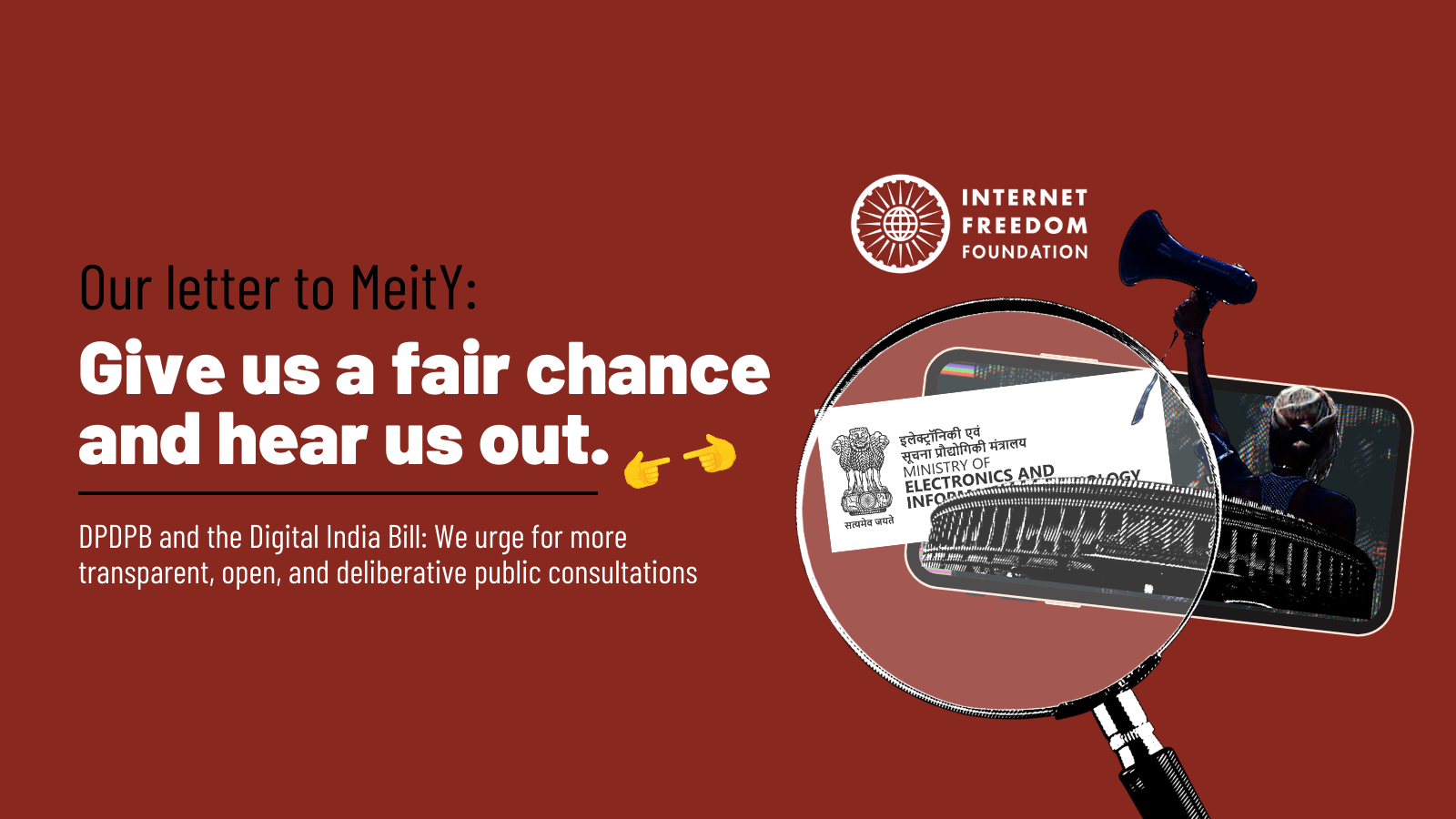
tl;dr
As several media reports pointed to the imminent release of the draft Digital Personal Data Protection Bill, 2022 (DPDPB, 2022) and the draft Digital India Bill, we wrote to the Ministry of Electronics and Information Technology’s (MeitY) on November 17, 2022, urging them to hold transparent and deliberative public consultations for both. Given the importance, urgency, and wide impact of these pieces of legislation, we recommended other steps that the Ministry may adopt to further improve public participation in the decision making process.
To Meity, with concern
Both the Minister of Electronics and Information Technology, Shri Ashniwi Vaishnaw and the Minister of State (MoS) for Information Technology, Shri Rajeev Chandrasekhar made statements covered in the media regarding the introduction of a draft Digital India Bill (see here and here), as well as the draft DPDPB (see here and here). On November 19, 2022, the DPDPB, 2022 was released by MeitY for public consultation. The Ministry has invited feedback on the DPDPB, 2022 in a chapter wise manner by December 17, 2022. While we appreciate that a draft bill has been put out for public consultation, we would have preferred if the Ministry had made available a white paper underlining the issues it considered while developing the “comprehensive legal framework”, of which the DPDPB, 2022 will be a crucial part. This is one request we raised in our letter to MeitY, one day before the DPDPB, 2022 was made public.
The other requests were as follows:
- The drafting and review process for a draft Digital India Bill and the DPDPB be in line with the Pre-legislative Consultation Policy (“PLCP”), 2014, adopted on February 05, 2014.
- The process must also respect several healthy precedents for public consultations set in the past, including provisions to send comments/submissions within a reasonable duration (no less than 30 days), making the comments publicly available and allowing for counter comments.
- The Ministry must proactively publish information on all its working groups on draft legislations, including any position papers/ white papers and internal minutes of meetings of all inter-departmental groups, in line with the public authority’s obligations under Sections 4(1)(b) and 4(1)(c) of the Right to Information Act, 2005.
The notice of public consultation accompanying the DPDPB, 2022 takes an unfortunate departure from one of the above mentioned healthy precedents as it states that “no public disclosure of the submissions will be made”. This will weaken public trust in the development of the DPDPB, 2022 as it hampers the principles of transparency and accountability in the consultation process.
We also urged the Ministry to publish a white paper, clarifying the government’s position on the recommendations made by the Joint Committee on the Personal Data Protection Bill, 2019 (JPC) in its report, the various components of the comprehensive legal framework, and composition of a working group that may have been formed to revise the legislative framework for data protection. Prior to the release of the DPDPB, 2022, we urged the Ministry to publish in advance the public consultation timelines for all the components of the comprehensive legal framework, including for the Digital India Bill and the cyber security policy.
With respect to the upcoming draft Digital India Bill., we appreciate the MeitY’s recognition of the rapidly changing digital ecosystem and the need to revamp the two-decade old, current legal framework governing it, i.e. the Information Technology (IT) Act, 2000. However, to ensure that any draft Digital India Bill is reflective of the recent developments in the digital ecosystem, the existing lacunae and inadequacies in the IT Act, 2000 must be subject to great scrutiny. To that end, the government must, in collaboration with multiple and diverse stakeholders, work towards building a statutory framework that safeguards ordinary Indians. In addition to a open, transparent, deliberate public consultation, MeitY must also publish a white paper underlining its intent and understanding behind introducing any forthcoming governance framework for the digital ecosystem.
The requirement to stress on the need for a truly open and public consultation process moving forward was felt due to past instances wherein MeitY has failed to adopt consistent and transparent practices for public consultations. For instance, MeitY recently issued multiple documents only to withdraw them later. This inconsistent practice was witnessed in the case of a notice dated June 01, 2022, seeking comments on the proposed draft amendments to the IT Rules, 2021, and draft Guidelines for the Anonymisation of Data released for public consultation in August, 2022. In February 2022, MeitY published the “Draft India Data Accessibility & Use Policy, 2022” to which substantial changes were made during the consultation period without any public acknowledgement. Such errors and recalls during the consultation process significantly reduce the quality and sanctity of the consultation process. Further, such inconsistent practices and actions reduce public trust in the policy consultation process and make it harder for interested stakeholders to meaningfully engage with the government. We hope that moving forward, the Ministry will not repeat such errors and ensure that the public consultation process for a draft Digital India Bill and the DPDPB is open, transparent, inclusive and deliberative.
Important Documents:


